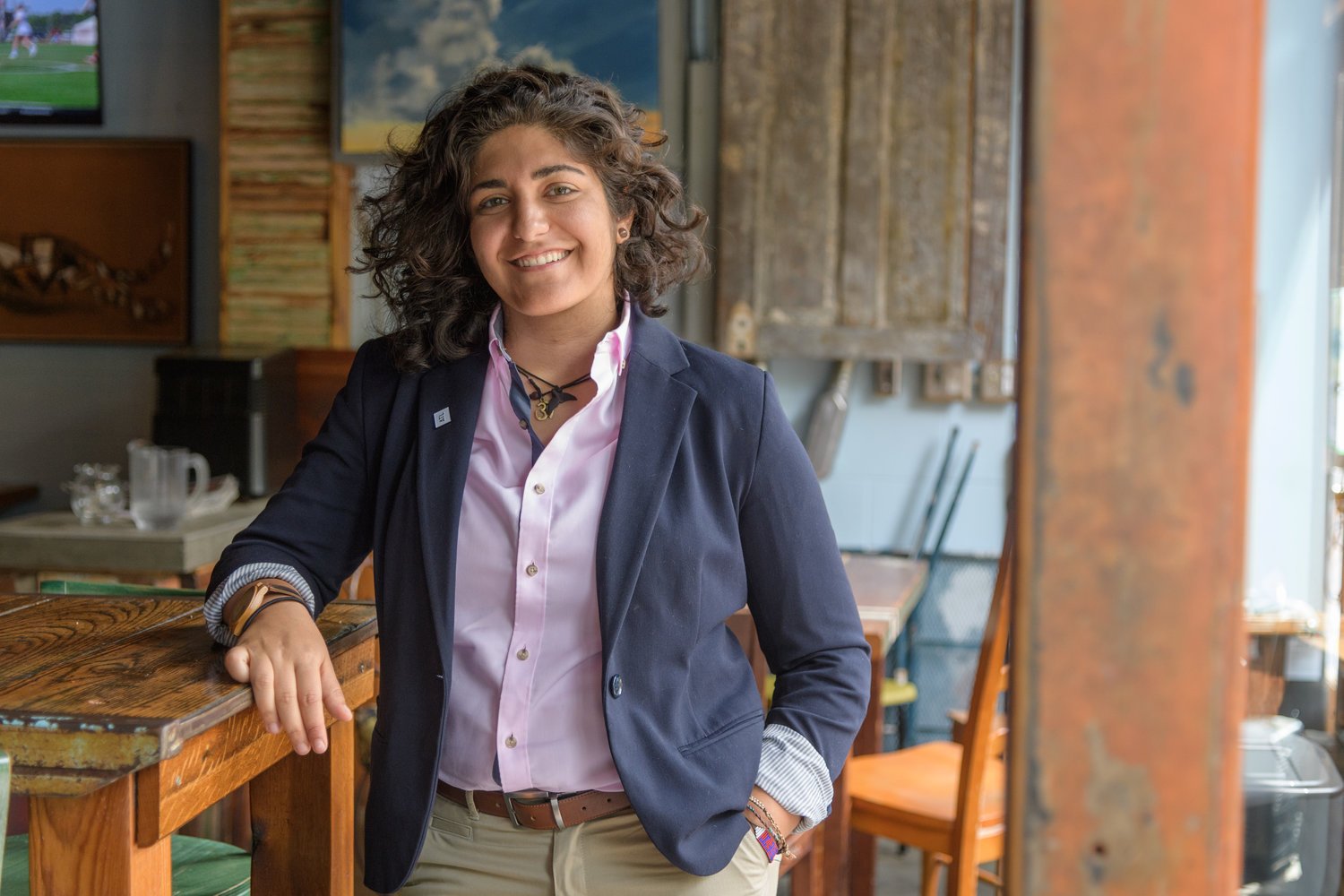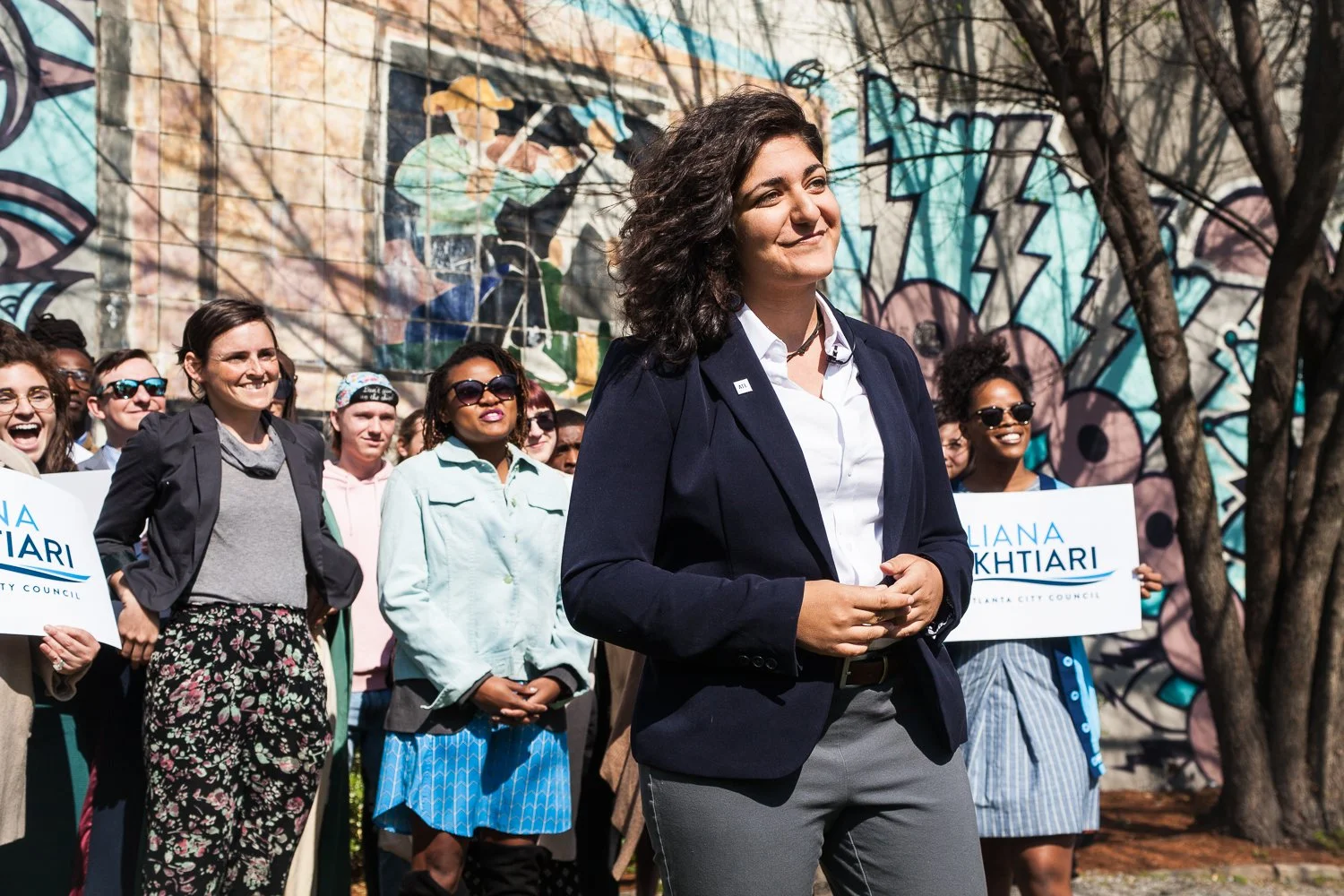Liliana Bakhtiari's Inclusive Vision for ATL
PHOTO BY MICHAEL SCHWARZ
On a balmy Sunday evening in Atlanta’s fifth district, Liliana Bakhtiari was pleading with one of her beloved rescue dogs to not lick its paw for risk of infection. When I walked into her home, it was in a state of organized upheaval. Ahead of a vital campaign fundraising deadline, Bakhtiari’s partner, Kristina Brown, a dancer and artist, was cleaning and rearranging their home, which sits just south of Cabbagetown off of Memorial Avenue. Brown was fashioning a campaign headquarters for Bakhtiari out of what looked like a former bedroom and some desks. This in-home headquarters is about to become the epicenter of their grassroots campaign to get the first out queer woman-of-color elected to Atlanta’s City Council.
That candidate is Liliana Bakhtiari and she is one of the most visible activists in the city, participating in international volunteer work and fighting for women's rights, environmental rights, water accessibility, affordable housing, and access to public transit. She announced her candidacy for Atlanta’s City District 5 over Facebook Live on March 23, 2017.
Bakhtiari was born at Piedmont Hospital to an American mother and a first-generation Iranian immigrant father who expatriated during the Iranian Revolution. Her mother worked to support Mr. Bakhtiari through school at Georgia State University until he graduated and opened a pharmacy in what Bakhtiari calls the “breadbasket of the Civil Rights Movement” — Martin Luther King Jr.’s neighborhood on historic Auburn Avenue.
The pharmacy quickly became a pillar of the community: “He was the first pharmacist to provide free delivery; talk about accessibility and the inability to navigate the city, combined with condensed poverty… You didn’t have Uber back then,” Bakhtiari told me. She “grew up outside the Grady Hospital trauma entrance handing out flyers” for her father’s business on the weekends, witnessing all kinds of strife. Grady, as we all know, has been the nexus of care for some of the most vulnerable Atlantans living in and around District 5. “The street where Piedmont is now – where all the Georgia State [University] housing is – that was some of the worst sex and drug trafficking in the city at the time, before GSU came and developed it out. They didn’t deal with it, they just brushed it under the rug, which is how city leadership deals with a lot of things here,” Bakhtiari told me. While her father’s pharmacy served the community, her involvement in the family business sparked her interest in tackling these issues in bigger ways; it’s no surprise that Bakhtiari’s next step is running for City Council.
PHOTO BY MICHAEL SCHWARZ
Some would say there has seen a shift in our city’s policies — from a focus on civil rights and inclusion to that of investing in bringing in outside talent. This shift has left communities of color and indigent families behind, or worse, completely pushed them out of their generational homes, when these are the people who made Atlanta an attractive destination at the start. As the city has exploded in population over the last decade or so, density and inclusivity has become a central concern for many longterm residents. According to Bakhtiari, “density is great, but density that isn’t inclusive isn’t something I can get behind. We see the disappearance of affordable housing fairly rapidly and what affordable housing there is is being held hostage by slumlords.” This is happening all across the city, but especially in the rapidly gentrifying fifth district she hopes to represent. “The building blocks of everything we have in this country are based on the working class. If you develop-out working class people without giving them a way to navigate back into the city to work, to continue participating in the economy, your economy will crash,” she said.
Bakhtiari recognizes the struggles facing these residents as they deal with possible expulsion from the communities that they built for themselves and their neighbors. She says “A lot of the legacies of Atlanta, the faces that make Atlanta what it is, get forced out through property tax raises, eminent domain, lack of job availability because Atlanta is investing more in outside workers than it is in people who are already here.
She does not hold all of city government accountable for this shift in policy, referencing the recently elected Atlanta City Council member Andre Dickens. Bakhtiari believes Dickens “is working very hard for affordable housing and seems to be an all-around progressive individual.” This is not to say that the more senior members of city government don’t reflect their districts, but with the type of projects being presented and completed, their commitment to current residents comes across as lip service. With the addition of things like the ferris wheel, streetcar, the Atlanta BeltLine’s track record and the idea of bringing a “Times Square” to downtown Atlanta, the policy shifts that frustrate Bakhtiari are glaringly obvious. These types of tourist-centric improvements are happening in the absence of investing in Atlantans that have always been here.
According to Bakhtiari, these projects are happening in opposition to necessary local improvements, including the expansion of public infrastructure so that “you aren’t putting out literal fires and having to adapt to a bridge collapse.”
It’s clear there are things the city must do to continue creating an attractive atmosphere for all walks of life, not just propping up expensive mixed-use developments in every neighborhood. Bakhtiari believes that merely bringing people here is not the answer. The reality is much less fun. She says “It’s not sexy to say ‘Oh, we fixed this road today’ or ‘We added this bridge, and our water treatment system just expanded two-fold’ — These are not the exciting headlines the general public wants, but our residents will be able to turn on their faucets, drive and bike down our roads.”
PHOTO BY JON DEAN
Talking with Bakhtiari, it’s easy to gather that her primary focus is on making the city’s promising economic future inclusive. Atlanta’s rapid growth over the course of the last decade was made possible in part by tax breaks for the film industry and historically affordable housing, but as the city grows and gentrifies, places for affordable housing are quickly turned into luxury condos and mixed-use developments that unsustainably raise property values across Atlanta. “Transient people are not bad,” she says, “but you must have a balance. We must be investing in the Atlantans that are already here and that means job training and ensuring affordability.” In addition to affordability, Bakhtiari says “Atlanta is cutting its progress off at the knees,” and considering how Atlanta is such a deeply car-dependent city, “Your public transportation system cannot just look like an ‘X’”.
For Bakhtiari, economic and social inclusivity is the correct way forward. The idea of an Atlanta that works for all might sound like an obviously compelling choice for anyone, but judging by the fact that MARTA still hasn’t expanded rail service, traffic only ever seems to be getting worse, and property values and rents are approaching all-time highs, current city leadership might not be looking out for its more vulnerable residents. “I got into this race because I saw every face I had ever known and all the spaces that shaped me disappear. The people who made Atlanta what it is are being forgotten,” Bakhtiari says. She refuses to forget.
Follow Liliana For Atlanta on Facebook and visit her website for more info.
Archive
- February 2025
- November 2024
- October 2024
- September 2024
- August 2024
- July 2024
- June 2024
- May 2024
- April 2024
- October 2023
- July 2023
- June 2023
- May 2023
- April 2023
- March 2023
- February 2023
- June 2022
- April 2022
- March 2022
- January 2022
- December 2021
- October 2021
- September 2021
- August 2021
- July 2021
- June 2021
- May 2021
- April 2021
- March 2021
- February 2021
- January 2021
- December 2020
- October 2020
- September 2020
- August 2020
- July 2020
- June 2020
- May 2020
- April 2020
- March 2020
- February 2020
- January 2020
- December 2019
- November 2019
- October 2019
- September 2019
- August 2019
- July 2019
- June 2019
- May 2019
- April 2019
- March 2019
- February 2019
- January 2019
- December 2018
- November 2018
- October 2018
- September 2018
- August 2018
- July 2018
- June 2018
- May 2018
- April 2018
- March 2018
- February 2018
- January 2018
- December 2017
- November 2017
- October 2017
- September 2017
- August 2017
- July 2017
- June 2017
- May 2017
- April 2017
- March 2017
- February 2017
- January 2017
- December 2015
- November 2015
- October 2015
- September 2015
- August 2015
- July 2015
- June 2015
- May 2015
- April 2015










